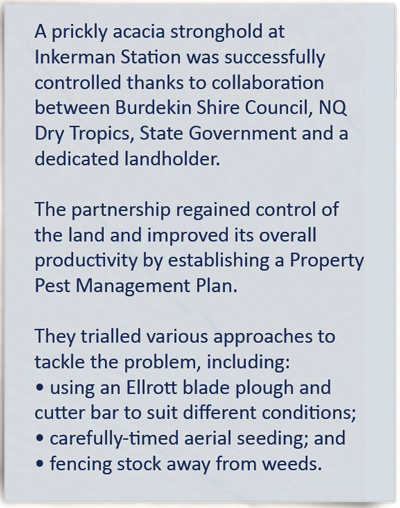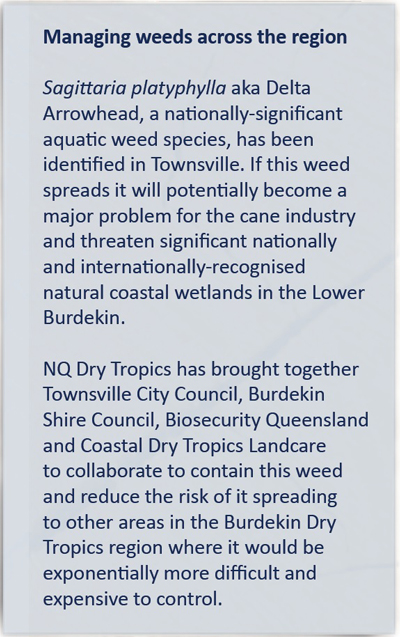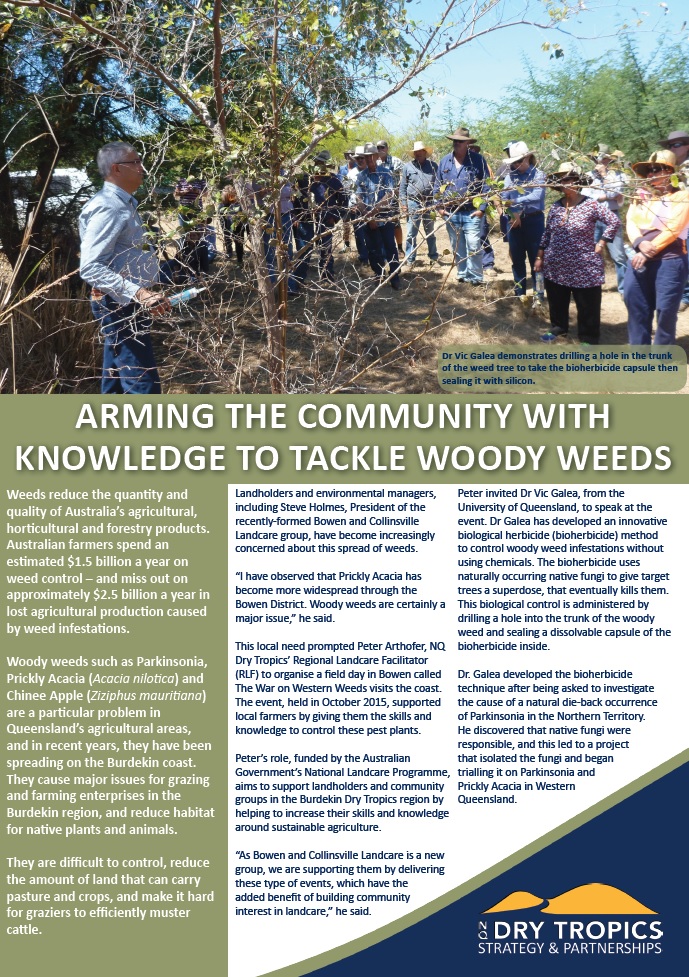
 The proliferation of non-native plants, and the unnatural spread of some native plants, leads to multiple impacts that affect the overall biodiversity of our region. They have dramatic effects on soil quality, water flow characteristics and quality, aquatic flora and fauna, and ecosystem processes. They occur in terrestrial systems from savannas, scrubs and rainforests through to aquatic areas such as riparian zones and wetlands. Riparian zones are especially susceptible to colonisation and spread of certain weeds because water and nutrients are in greater supply in these areas.
The proliferation of non-native plants, and the unnatural spread of some native plants, leads to multiple impacts that affect the overall biodiversity of our region. They have dramatic effects on soil quality, water flow characteristics and quality, aquatic flora and fauna, and ecosystem processes. They occur in terrestrial systems from savannas, scrubs and rainforests through to aquatic areas such as riparian zones and wetlands. Riparian zones are especially susceptible to colonisation and spread of certain weeds because water and nutrients are in greater supply in these areas.
Weeds have been introduced either historically as a food source for humans and livestock, or as gardening plants that subsequently spread into natural environments. Illegal dumping, especially of household green waste in natural areas, helps to spread weeds and diseases into rural areas, which can significantly impact on the natural ecology as well as the productivity of agricultural enterprises.
Populations of feral pigs, deer, horses and rabbits have all been listed as priority species in the our Burdekin Dry Tropics Regional Pest Management Strategy. The EPBC Act recognises impacts particularly from feral cats, pigs, foxes, tilapia and rabbits, as key threatening processes. In general, feral animals:
- outcompete native species for resources;
- disturb the ground;
- damage vegetation communities;
- destroy culturally-sensitive areas;
- spread weed seeds;
- consume small vertebrates and eggs (for instance, native frogs and lizards);
- spread disease;
- pollute and damage riparian and wetland areas; and
- impact on agriculture and other industries.
The Biosecurity Act 2014 provides the statutory direction for managing pests in Queensland. However, the resources available for managing pest plants and animals are limited in contrast to the enormous costs of the pests. Collaboration and alignment of effort are key to ensuring that we maximize the value of those resources and support land managers to control pests on-ground. In the Burdekin Dry Tropics , a Regional Pest Management Group (RPMG), whose membership includes landcare and industry representatives, infrastructure managers, and local and state governments, oversees the strategic and collaborative delivery of the Regional Pest Management Strategy (2014-2019). The group prioritises our region’s pest plant and animal management efforts at a landscape level and across local government boundaries to maximize the effectiveness of limited resources (NQ Dry Tropics, 2014).
Case Study
 |
| Arming the community with knowledge to tackle woody weeds |
Related information
- Atlas of Living Australia. (2012). Weeds of National Significance.
- Burdekin Dry Tropics Natural Resource Management, Northern Gulf Resource Management Group, Southern Gulf Catchments. (2013). Grader Grass Management Guide.
- Department of Agriculture & Fisheries (2016). Weeds of National Significance (WONS).
- Calvert, G. (2011). Prickly acacia eradication project.
- Calvert, G. (2015). Technical report & future management options for Delta Arrowhead (Sagittaria Platyphylla) in the Burdekin Dry Tropics NRM region.
- Mitchell, J. (2011). Exclusion Fencing of Feral Pigs.
- Mitchell, J. (2011). Feral Pig Control.
- Mitchell, J. (2011). Poisoning of Feral Pigs.
- Mitchell, J. (2011). Shooting/Hunting of Feral Pigs.
- Mitchell, J. (2011). Trapping of Feral Pigs.
- Mitchell, J. (2011). Wild Dog Control.
- NQ Dry Tropics. (2014). Regional Pest Management Strategy for the Burdekin Dry Tropics 2014-2019.
- NQ Dry Tropics. (2016). (Revised). Weed Free.
